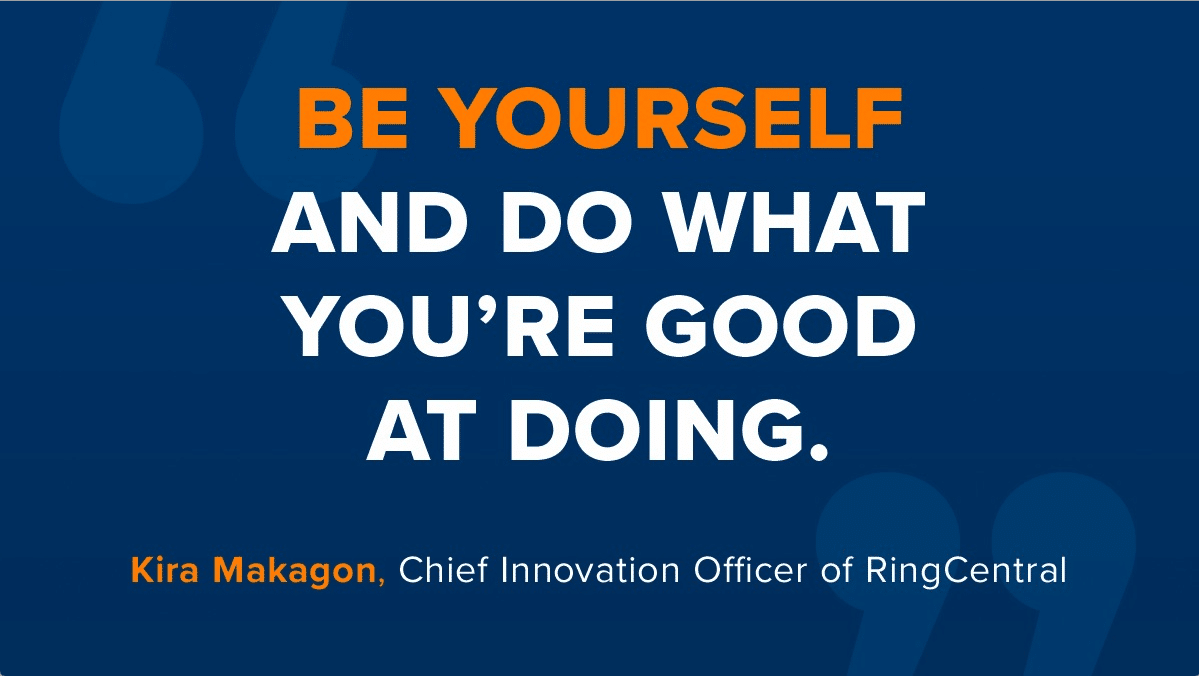
I recently had the pleasure of facilitating a panel we hosted at RingCentral with four amazing women, all C-level executives from businesses in Silicon Valley. Our conversation traversed a wide range of topics, from key trends and challenges in the industry, to the shift in the modern boardroom, to how to juggle work and personal life successfully. Each panelist offered inspiring and insightful words of wisdom and practical advice to those in the audience and beyond. Below are ten of my favorite takeaways.
- Be yourself and do what you’re good at doing.
You can only be good at what you do if you’re doing what you’re good at. Regardless of where you are in your career, don’t be in a rush. Don’t go title chasing, because it’s not for everyone. You can get to a title and you can be miserable, or you could be a great individual contributor and not a great manager.”-Kira Makagon, Chief Innovation Officer, RingCentral
- Ensure all employees are aligned to the goals of your business.
“There’s a great analogy, if you guys have ever seen any of the videos on YouTube of people trying to pull a truck. If you think of a huge truck, how could a group of four people ever pull one? But what you see is when people have ropes and they’re together trying to pull the truck, they think they’re pulling in the same direction, but it’s really like a few degrees in different directions, and the truck goes absolutely nowhere. But when they really get aligned and get to the place where they’re pulling, not just mostly in the same direction, but exactly to the degree in the same direction, the truck just starts to roll. That’s one of the biggest challenges, and probably most of our businesses in technology is really getting aligned, getting focused and then making that truck roll.”-Karen Peacock, COO of Intercom
- Assume good intent.
“I think, this area that is particularly important these days, where outrage is the rage, and it’s super easy to have everything be outrageous to us, is to always assume good intent. I counsel teams to start a meeting and start interactions assuming good intent of each other because so many things will then fall by the wayside, and you will not get worked up about it because you’re like, ‘I’m assuming good intent here. We’re trying to do the right thing for our customers, for our business, for the team.’”-Kira Wampler, former CEO of Art.com
- Enable intimacy with virtual employees.
“The biggest thing we think about on a daily basis is we have 350 women today that we’re supporting and helping to essentially create the [virtual] experience of a golf course in the cloud. And how do we enable intimacy when we’re all virtual? And how do you create an environment where people want to do favors for each other? They want to create opportunity for one another and they’re exactly in the right place at the right time for each other. We’re constantly iterating and learning, and I think that’s where I love speed. The fact that you can change your business model so quickly as you learn, and it’s just a great thing as we’re experiencing even through that process.”-Coco Brown, Founder & CEO of Athena Alliance
- Don’t just do your job; expand your scope.
“When someone asks you to do something, there’s probably sort of a narrow definition of your job of I’m supposed to write a spec on how this feature could work or I’m supposed to run three tests around conversion rate optimization for this particular site. Or I’m supposed to answer these 10 customer calls in an hour or whatever it is. Don’t just do your job. Yes, do your job; make sure that you deliver on the core things that you signed up to do. But think about what else you could do. Think about what is the implication, the learning, the next steps. How could you be better at answering those calls the next hour? How could you help the rest of the team? Are there certain tools you could build? Is there knowledge that you could share? What is it that when you come to your manager saying, ‘I’ve done this,’ what’s your manager going to ask you to do next?”-Karen Peacock, COO of Intercom
- Always be recruiting.
“We are awash in money in the Valley, which is something good and bad, and we’re awash in opportunity. But what we don’t have enough of is amazing, amazing people. And so, I think, we’re constantly on the search, whether, it was all of my prior executive roles, my board roles and advisory roles that I have now, we’re just constantly always recruiting. I would say this: no matter what your level inside an organization, one of your mantras ‘is always be recruiting.’”-Kira Wampler, former CEO of Art.com
- Be a good team player.
“Regardless what company you’re in, be a good team player; on your team, be a good team player. People alone don’t make a difference, they need people around them to make that difference. They’re contributing to making a difference, but just like building a company, it takes all of you to be able to work or go your own away.”-Kira Makagon, Chief Innovation Office, RingCentral
- Be curious.
“Always be a ferocious learner and be curious about things. Then really push yourself to apply those things. Push yourself to have impact. How can you make your customer’s life better? How can you make one of your partner’s or partner organization’s lives better? How can you drive material impact to the business? Always be learning and always be pushing for having an impact.”-Karen Peacock, COO of Intercom
- Mentorship is a mindset.
“I think, structured mentorship is kind of overhyped, that everyone should have a personal board of directors as your mentor. And I get it… I think that there’s interesting aspects to that, but I would say mentorship is a mindset. Everybody around you is a mentor. You need to think about what phase you’re in, what key moment you’re facing, and seek around you where you can find good advice, guidance, and some sounding boards. My kids are my mentors in a lot of ways.”-Coco Brown, Founder & CEO of Athena Alliance
- Recalibrate your expectations around speed of business.
“When I first got to Lyft, I mean, it was amazing if a car got to you within five minutes of the ETA. And, I think, now most people would probably cancel if it was anything more than two minutes. Just pause to reflect on that for a moment that a car with a nonprofessional driver is making its way to you almost wherever you are in two minutes. I mean, just reflect on what is required from technology and human potential. When you think about that consider what this means to me? Or what does it mean to my career? We should always think, how can we be doing something faster? How can this process be more efficient? How can we make our lives, our customers’ lives easier and more efficient?”-Kira Wampler, former CEO of Art.com
This panel was organized as part of the RingCentral Employee Innovation Program. Share your own stories and experiences through Twitter, using the hashtag #womeninleadership.
Originally published Aug 23, 2019, updated Aug 11, 2020



